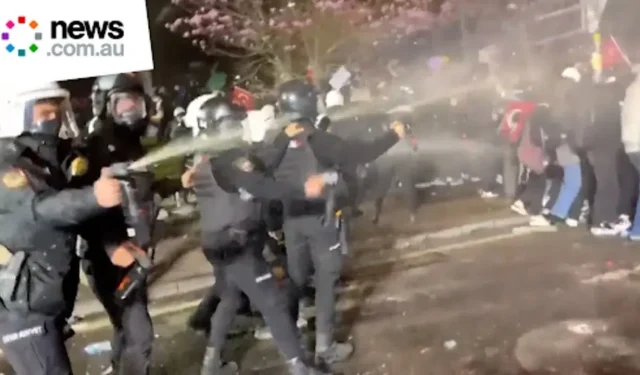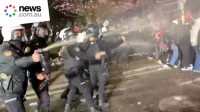Introduction: Mass Protests Emerge Over Political Arrests
In a significant surge of public discontent, tens of thousands of individuals have taken to the streets across Turkey in response to the arrest of Istanbul Mayor Ekrem Imamoglu, who is viewed as a key political rival to President Tayyip Erdogan. Protests began on Wednesday and have spread to major cities, including Izmir and Ankara, marking a pivotal moment in the nation’s political landscape.
Clashes Erupt Amidst Demonstrations
Although many protests began peacefully, tensions escalated in the following nights, particularly in Izmir and Ankara, where confrontations between demonstrators and law enforcement occurred. Reports indicate that police responded to the escalating unrest with teargas and pepper spray pellets, aiming to disperse the large crowds gathered in defiance of the government’s actions against Imamoglu.
The Arrest of Ekrem Imamoglu: A Catalyst for Unrest
Ekrem Imamoglu, a prominent figure in Turkish politics, has gained traction as one of President Erdogan’s main political rivals. His recent arrest has galvanized the populace, leading to protests firmly focused on his release and broader concerns regarding governmental transparency and democracy in Turkey. Imamoglu’s rising popularity, as reflected in several opinion polls where he leads Erdogan, underscores the deepening political divisions within the country and the growing discontent with the current administration.
The Broader Impact of the Protests
The protests signify a critical moment for public sentiment in Turkey. Beyond the immediate concern for Imamoglu’s political future, these events raise questions regarding civil liberties and the right to protest in an increasingly authoritarian political environment. Observers point out that continued demonstrations could further strain relations between the government and citizens, particularly if police actions remain aggressive.
Potential Consequences for Turkish Politics
As the situation develops, the potential consequences for Turkey’s political sphere are profound. Should the unrest continue, it may prompt further actions from the government aimed at quelling dissent, potentially leading to increased international scrutiny regarding human rights practices in Turkey. Additionally, if opposition figures such as Imamoglu maintain their momentum, the political dynamics could shift significantly heading into future elections, influencing both local and national governance.


